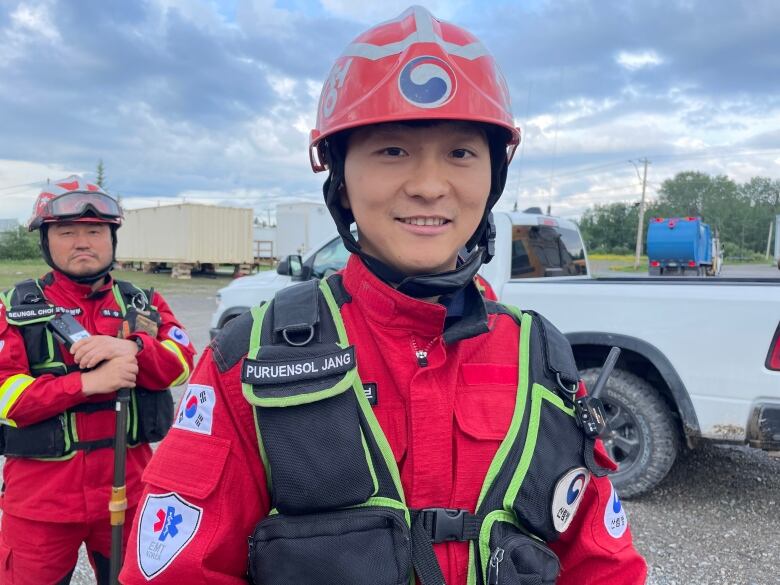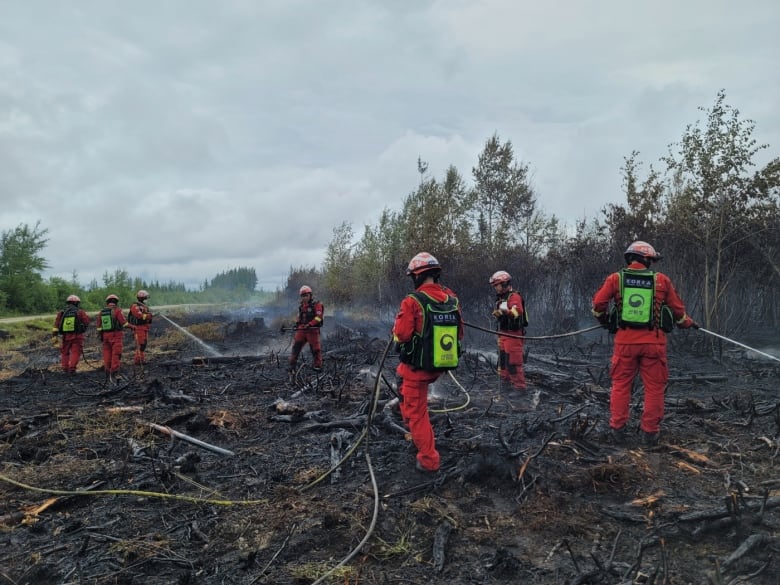It’s all the same forest, say Korean firefighters battling blazes in Northern Quebec | CBC News

[ad_1]
Dressed in their red uniforms, the men of the Korea Forest Service move as one, stretching and chanting along with the staccato instructions of the drill instructor. Next to where they’re warming up is their base camp, where boxes of ramen noodles, instant rice and sweet Korean snacks are scattered all around.
At first glance, you could mistakenly believe you are somewhere in South Korea.
But these firefighters are in Lebel-sur-Quévillon, a small city in the north of Quebec that’s been evacuated twice already this summer due to the threat of wildfires.
The Canadian Interagency Forest Fire Centre (CIFFC) told CBC News over 3,700 foreign firefighters have travelled to Canada to help battle the historic forest fires this summer — including 140 South Koreans, the first-ever team sent from there to help battle the blazes.
CIFFC says Costa Rica, Spain, Portugal, France, Brazil and Chile have all sent firefighters to Canada for the first time, too.
The South Korean foreign ministry told CBC News their team was selected after a competitive process, and those who made the cut are the best of the best. The team includes former spies sent to infiltrate North Korea, special army forces and Navy SEALS.
They’ve been camping next to a golf course in the small town that’s about 625 kilometres northwest of Montreal, with a population of 2,000 people.
They’ve spent their days here since the beginning of July, waking up around 5 a.m., travelling an hour or two on yellow school buses to the fires, then coming back to the campsite, exhausted and covered in bug bites.
One of their tasks is digging up the earth still smoldering below ground, and extinguishing it. It’s a kind of firefighting none of them are used to.
Thousands of firefighters from around the world have been helping fight Canada’s wildfires. CBC got special access to an elite team of South Korean firefighters in Northern Quebec where they’re adapting to different techniques and foods, and making friends along the way.
“None of us believed it at first. But putting out fires here, we saw how the fires are burning through the roots of the trees,” said Jang Puruensol, a 28-year-old firefighter from Gwangju, in the country’s southwest, who left behind his fiance to fight fires in Quebec.
“We’re used to going several kilometres, putting out fires as we go,” he continued in Korean.
When the team got to Quebec, Jang says Quebec’s forest fire prevention agency told them they would only be able to advance around 600 metres in a day.

Working together
The team has had to get used to more than a new style of firefighting. Some said it took some time to get used to the food, too. But the Korean community in Montreal sent some familiar items up their way, the South Korean foreign ministry told CBC News. Now, the Koreans are fighting fires with canned kimchi in their pockets.
Canadian wildfires are burning at an unprecedented pace this year. There were 1,004 fires across Canada as of Friday, according to the CIFFC, burning 12.3 million hectares – a total area larger than South Korea, itself.
The team is working closely with U.S. firefighters, who have also been deployed to the area. Each day at a morning briefing, the teams go over the situation on the ground, and come up with a plan for how to fight the blazes.
It’s not the first time Canadians, Americans and South Koreans have worked together – they’re old allies from the Korean War over 70 years ago. Now, they’re again working across languages to come up with a battle plan.

Kim Dae Hyun, 36, is getting married next month. He says his fiance has been worrying about him. He, too, worries about loved ones back home, as heavy torrential rains have claimed dozens of lives there.
“The situation in Korea right now is quite bad, and on that point I want to go back and help, too, but I also know that it’s important for me to be here and help out,” said Kim.
Kim Man Ju, 54, who has over 15 years of experience fighting fires, says the heavy rains back home and the historic wildfire season in Canada show the global scale of climate change. The responsibility to help, he feels, extends past borders.
“In my mind, it’s the same forest. We should keep the forest. That means a promise to the future, a promise to the globe.”
Kweon Ki Hwan, who is leading the South Korean disaster relief effort, says it’s what friends do.
“We remember Canada sent 26,000 troops to Korea during the Korean War to defend the freedom and democracy of Korea, and you paid a heavy price,” Kweon said.
“We Koreans never forgot your sacrifice.”
Climate scientists say July is poised to be the hottest month on record ‘by a considerable margin.’ The United Nations is warning an ‘era of global boiling’ has now replaced the era of global warming.
Wildfires likely to get worse
It’s possible Canada will need their help again. Scientists say wildfire seasons are likely to get more intense in the future.
And even with the thousands for international firefighters already here, CIFFC says more will certainly be needed before the summer’s finished.
The Canadian government says it recognizes all the help it’s getting from other countries, and is working to bolster domestic firefighting capacities. In a statement, a spokesperson for the office of the Minister for Emergency Preparedness said Canada is hiring more than 300 Indigneous firefighters and buying more specialized equipment.

“While we don’t know what the next wildfire season has in store, we’ll continue to build our capacity to respond to these events and work to mitigate the risks facing Canadians,” said Annie Cullinan, a spokesperson at the Office of the Minister of Emergency Preparedness, in a statement.
The Koreans CBC News spoke with in Lebel-sur-Quévillon say they’d be happy to come back if the need should ever arise again.
They add they also hope Canadians will also step in to help out if they ever need the help, too.
[ad_2]

